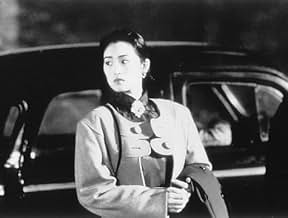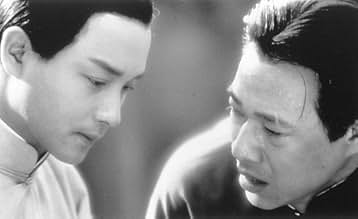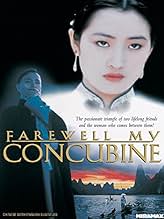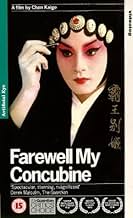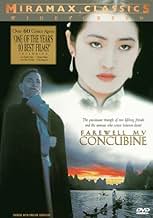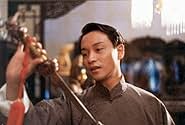IMDb रेटिंग
8.1/10
35 हज़ार
आपकी रेटिंग
दो लड़के, 1924 में, पेकिंग के एक ओपेरा ट्रेनिंग स्कूल में मिलते हैं. उनके बीच हुई दोस्ती लगभग 70 वर्षों तक चलेगी और चीन के इतिहास के सबसे अधिक परेशानी वाले समय की गवाह बनेगी.दो लड़के, 1924 में, पेकिंग के एक ओपेरा ट्रेनिंग स्कूल में मिलते हैं. उनके बीच हुई दोस्ती लगभग 70 वर्षों तक चलेगी और चीन के इतिहास के सबसे अधिक परेशानी वाले समय की गवाह बनेगी.दो लड़के, 1924 में, पेकिंग के एक ओपेरा ट्रेनिंग स्कूल में मिलते हैं. उनके बीच हुई दोस्ती लगभग 70 वर्षों तक चलेगी और चीन के इतिहास के सबसे अधिक परेशानी वाले समय की गवाह बनेगी.
- 2 ऑस्कर के लिए नामांकित
- 24 जीत और कुल 12 नामांकन
Zhenxiang Fei
- Shitou as a Child
- (as Yang Fei)
फ़ीचर्ड समीक्षाएं
10bluzman
As an WASP American married a lady from Mainland China, I have a great interest in and curiosity about China. My wife's mother and father actually saw these men perform. I have discussed this movie with many Chinese friends, most of whom saw it before coming to this country. Some of them knew the story from real life as well as the movie. They are quick to point out the accuracy of the story in its detailing of Chinese history from the end of the last dynasty until its end during the Cultural Revolution. They also claim that the major happenings in the movie are real events, not the norm for most of Hollywood's "real life" stories. One point of conjecture in the movie is the sexually of Dieyi. It is presumed he is/becomes a homosexual. However, from what I have learned about the Peking/BeiJing Opera through reading and discussions, it is more likely that Dieyi was virtually unaware of his own sexuality. As opposed to being a hetero or homosexual, he was asexual in a way like it had be surgically removed from his being. It had been taken from him through the rigors of his training and years of performance. His love for Xiaolou is powerful, maybe even surpassing ordinary man/woman love, but platonic in as much as his mind is devoid of its sexuality. He suffers the same jealous anger and sense of betrayal as might be found when a wife discovers the cheatings of her husband, and reacts, unfortunately, accordingly (Heroin). His real, enduring love is performing. It is the one constant that has seen him through. He throws himself into it, being willing to perform for anyone, even as it drives the story to the end. The end of the movie is not satisfying to everyone. It was not a Hollywood ending. However, it was reality.
A masterpiece in every sense of the word, Chen Kaige's breath-stealing parable of China's multi-layered political revolution, is centred on two men. Chen presents us with an absorbing story of a 52 year-old relationship between two opera actors mounted upon an impossibly large canvas. But without sacrificing any intricate plot development or smudging over any delicate complexity in the relationship.
Considered by many to be one of the greatest epics of all time, this film rightly established Chen's reputation as one of the most brilliant narrative and artistic directors of our time, along with other such contemporary auteurs as Kieslowski, Bertolucci and Kurosawa.
You can not call yourself a film-buff if you haven't seen this movie. And film-students: you can witness the true art of filmmaking and story telling through the skilled hands of Chen Kaige's Farewell My Concubine.
Considered by many to be one of the greatest epics of all time, this film rightly established Chen's reputation as one of the most brilliant narrative and artistic directors of our time, along with other such contemporary auteurs as Kieslowski, Bertolucci and Kurosawa.
You can not call yourself a film-buff if you haven't seen this movie. And film-students: you can witness the true art of filmmaking and story telling through the skilled hands of Chen Kaige's Farewell My Concubine.
I've seen this movie more times than I can count and I cry every time. I first saw it in the theater in 1993 and I was rooting for it to win Best Foreign Film Oscar, but it lost to the far inferior Belle Epoque (Spain). As to the person who wrote that this film made Cheng Dieyi seem like he was made to be gay because of abuse, I think you need to take another look. To my mind, Dieyi seemed to be infatuated with Shitzou as soon as he got there. However you look at it, this is a film that has great performances all around. I especially loved Leslie Cheung as the adult Cheng Dieyi (requiem eternem Leslie, 1956-2003), not to mention Gong Li. An excellent film, but be forewarned: it's almost three hours long. 10/10
I have had a great deal of trouble writing this review. Every time I make a start I can find nothing to get my teeth into and no coherent thread to interconnect my thoughts. While there are many potential sub-topics they all seem to stand in isolation. While this may simply be a reflection of my inability to string two sentences together I think in this case it pretty accurately summarizes the issues I have with this movie.
It is difficult to figure out what this movie is and if asked to summarise it in 25 words or less I would be flummoxed. Is it a Chinese history movie? An opera movie? A Chinese culture lesson? A love story? A story of betrayal? A story of pseudo or actual homosexuality? It is snippets of all of these and probably more, but it does not really do justice to any of them. Basically it suffers from multiple personality disorder and unfortunately we don't get enough time with any of them to relate to any of them. Yes, the history and cultural aspects are interesting in their way but don't really add anything to our understanding of the horrors of the Japanese invasion of China, the Nationalist/Communist struggle, the early Communist era and the later Cultural Revolution. Yes, it is a "love story" between the two actors who play the King and the Concubine, but we never experience any passion or come anywhere close to connecting to either of these characters to really care. The "King" character in particular is very undeveloped, little more than a cardboard cut-out who happens to be the object of the "Concubine's" unrequited love. The character played by Gong Li is also skin deep and we never really care about her or her relationship with the "King" actor – indeed the random and non-sensical way in which these two characters become engaged simply nukes any credibility that this relationship might have had, and by extension destroys the credibility of any other relationship on the movie, most importantly the pivotal one between the "King" and the "Concubine". The betrayal, which I gather meant something personal to the director, is dealt with too curtly to have any effect at all. The character of the "son", raised from an abandoned baby, is totally illogical and we simply don't get to know him well enough to care about him or understand why he would possibly want to betray his adoptive parents. It all just seems facile and silly. We never really understand (or at least, I don't) the "homosexual" overtones of the "Concubine". Was he simply beaten into a form of insanity in which he thinks he is always in character as a woman? Is he actually a homosexual? His "king" friend seems to be too thick to understand the "Concubine's" feelings for him and this to me trivializes the whole "affair". And to be honest, none of the characters come across as being particularly nice, in fact the Concubine character comes across more as a petty, whinny, jealous, lightweight flake than a tragic figure we could weep for.
OK, just because a film is not perfect doesn't mean you should not watch it. "Farewell My Concubine" is one of those films which is a "must see" despite its failings. If it falters as an emotionally satisfying and coherent movie it is a stunning technical tour de force and a masterpiece of its kind. Just to have made a movie of this scope is an achievement, almost to the point that its success is secondary, crazy as that may sound. It is a movie of such breadth that it is impossible to take in completely in one sitting, and that is perhaps the ultimate test – you know you need to see it again to understand it but can you care enough about it to make that effort? But – trust me - you need to see this movie – your education as a movie goer is incomplete unless you do. You will enjoy it, and you will be moved to have an opinion, one way or the other.
It is difficult to figure out what this movie is and if asked to summarise it in 25 words or less I would be flummoxed. Is it a Chinese history movie? An opera movie? A Chinese culture lesson? A love story? A story of betrayal? A story of pseudo or actual homosexuality? It is snippets of all of these and probably more, but it does not really do justice to any of them. Basically it suffers from multiple personality disorder and unfortunately we don't get enough time with any of them to relate to any of them. Yes, the history and cultural aspects are interesting in their way but don't really add anything to our understanding of the horrors of the Japanese invasion of China, the Nationalist/Communist struggle, the early Communist era and the later Cultural Revolution. Yes, it is a "love story" between the two actors who play the King and the Concubine, but we never experience any passion or come anywhere close to connecting to either of these characters to really care. The "King" character in particular is very undeveloped, little more than a cardboard cut-out who happens to be the object of the "Concubine's" unrequited love. The character played by Gong Li is also skin deep and we never really care about her or her relationship with the "King" actor – indeed the random and non-sensical way in which these two characters become engaged simply nukes any credibility that this relationship might have had, and by extension destroys the credibility of any other relationship on the movie, most importantly the pivotal one between the "King" and the "Concubine". The betrayal, which I gather meant something personal to the director, is dealt with too curtly to have any effect at all. The character of the "son", raised from an abandoned baby, is totally illogical and we simply don't get to know him well enough to care about him or understand why he would possibly want to betray his adoptive parents. It all just seems facile and silly. We never really understand (or at least, I don't) the "homosexual" overtones of the "Concubine". Was he simply beaten into a form of insanity in which he thinks he is always in character as a woman? Is he actually a homosexual? His "king" friend seems to be too thick to understand the "Concubine's" feelings for him and this to me trivializes the whole "affair". And to be honest, none of the characters come across as being particularly nice, in fact the Concubine character comes across more as a petty, whinny, jealous, lightweight flake than a tragic figure we could weep for.
OK, just because a film is not perfect doesn't mean you should not watch it. "Farewell My Concubine" is one of those films which is a "must see" despite its failings. If it falters as an emotionally satisfying and coherent movie it is a stunning technical tour de force and a masterpiece of its kind. Just to have made a movie of this scope is an achievement, almost to the point that its success is secondary, crazy as that may sound. It is a movie of such breadth that it is impossible to take in completely in one sitting, and that is perhaps the ultimate test – you know you need to see it again to understand it but can you care enough about it to make that effort? But – trust me - you need to see this movie – your education as a movie goer is incomplete unless you do. You will enjoy it, and you will be moved to have an opinion, one way or the other.
'Farewell My Concubine' is, in a word, excellent.
Though often portrayed as haunting and disturbing, it's also quite touching at times... attributed largely to the outstanding emotional performances by the film's lead cast. Hands down, Chen Kaige has directed one of the most beautiful films involving the fall of the great Imperial China... and subsequently... the friendship of two of China's greatest leading opera performers.
Leslie Cheung's role as Cheng Dieyi, the tormented 'concubine' of the story, is absolutely astounding, and is probably one of his greatest performances to date. Fengyi Zhang plays well opposite Cheung, and Gong Li is fantastic as always. The production sets are superb, as are the costumes and cinematography.
Definitely a must see for all fans of foreign cinema, and certainly worthwhile for all newcomers.
10 out of 10
Though often portrayed as haunting and disturbing, it's also quite touching at times... attributed largely to the outstanding emotional performances by the film's lead cast. Hands down, Chen Kaige has directed one of the most beautiful films involving the fall of the great Imperial China... and subsequently... the friendship of two of China's greatest leading opera performers.
Leslie Cheung's role as Cheng Dieyi, the tormented 'concubine' of the story, is absolutely astounding, and is probably one of his greatest performances to date. Fengyi Zhang plays well opposite Cheung, and Gong Li is fantastic as always. The production sets are superb, as are the costumes and cinematography.
Definitely a must see for all fans of foreign cinema, and certainly worthwhile for all newcomers.
10 out of 10
क्या आपको पता है
- ट्रिवियाJackie Chan was originally offered the role of Duan Xiaolou due to his own childhood experience of training in the Peking Opera. But he turned it down, fearing that the film, which deals with themes of homosexuality, might tarnish his image.
- गूफ़When Douzi is first examined by the owner of the opera troupe, his extra finger is on his right hand below the thumb. When he withdraws the hand from the opera troupe owner, he pulls back his left arm. When his mother cuts the extra finger off a few moments later, it is now on his left hand, next to his pinkie.
- भाव
Master Yuan: A smile ushers in the spring.
Master Yuan: A tear does darken all the world.
Master Yuan: How truly does this befit you. To you... only you are possessed of such charm.
- इसके अलावा अन्य वर्जनThe version presented in the U.S. is different from the original, longer cut, that was distributed internationally. The following differences exist in the U.S. version:
- The scene where Duan and Juxian are drinking after their wedding was originally directly after the wedding scene, rather than after the bloodletting at the Yuan-Cheng dinner.
टॉप पसंद
रेटिंग देने के लिए साइन-इन करें और वैयक्तिकृत सुझावों के लिए वॉचलिस्ट करें
- How long is Farewell My Concubine?Alexa द्वारा संचालित
विवरण
बॉक्स ऑफ़िस
- बजट
- $40,00,000(अनुमानित)
- US और कनाडा में सकल
- $55,49,086
- US और कनाडा में पहले सप्ताह में कुल कमाई
- $69,408
- 17 अक्तू॰ 1993
- दुनिया भर में सकल
- $74,37,725
- चलने की अवधि2 घंटे 51 मिनट
- रंग
- ध्वनि मिश्रण
- पक्ष अनुपात
- 1.85 : 1
इस पेज में योगदान दें
किसी बदलाव का सुझाव दें या अनुपलब्ध कॉन्टेंट जोड़ें



